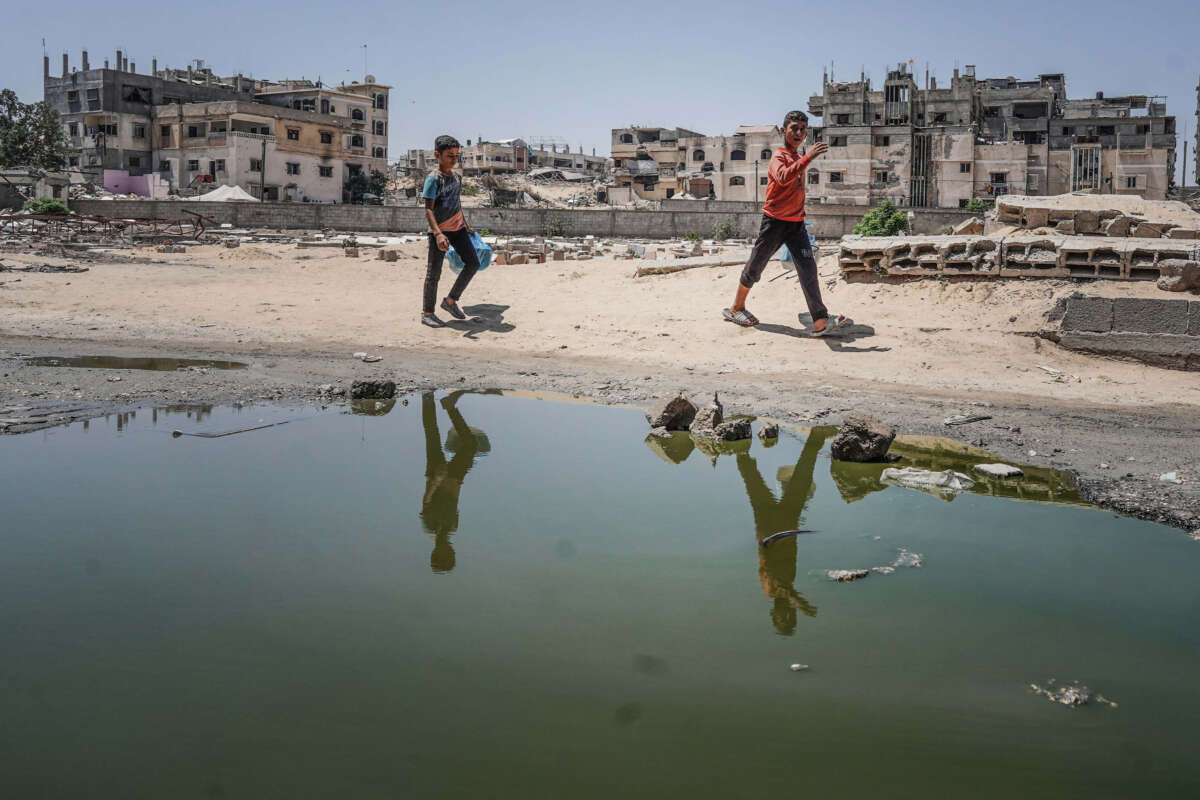Poliovirus has been detected in sewage samples at six locations in the Gaza Strip, the World Health Organization said on Friday, following announcements from both the Israel and Gaza health ministries.
Vaccine-derived poliovirus type 2 was found in samples taken on June 23 from sites in Khan Younis and Deir al-Balah.
Public health authorities expressed grave concerns about the findings, which, though no cases have yet been discovered, raise the possibility of an outbreak of polio, a highly infectious disease that often causes paralysis and can be fatal.
“Detecting the virus that causes polio in wastewater heralds a real health disaster and exposes thousands of residents to the risk of contracting polio,” Gaza’s health ministry said in a statement.
Tanya Haj-Hassan, a pediatric intensive care physician, told Al Jazeera the presence of the poliovirus was a “ticking time bomb,” especially given the lack of ability to isolate and care for people who contract the disease.
Haj-Hassan warned that it would be “catastrophic” if the disease spread among healthcare workers, given that the medical system has already been “annihilated by direct targeting, by abductions of healthcare workers, by [the] killing of healthcare workers.”
Dahlia Scheindlin, a Tel Aviv-based political analyst, called news of the presence poliovirus “absolutely shocking, stunning, [and] unthinkable” in a series of social media posts.
“The health crisis in Gaza has been catastrophic from the start,” Scheindlin wrote, seemingly addressing Israelis. “If you’re incapable of realizing that civilians should never have been in this situation, maybe the prospect of anyone getting polio, river to sea, where we are ‘one epidemiological family,’ will get through.”
Yes, it's happened. Polio detected in #Gaza sewage. IDF wants all soliders vaccinated/boosted. Live btwn river & sea and scared? you should be. Know what wd work well? Stopping the war, immediate rehab of Gaza's health system & all civilian infrastructure 1/7 🧵
— Dahlia Scheindlin (@dahliasc) July 18, 2024
Conditions in Gaza have been ripe for an outbreak of infectious disease — the “perfect environment” for transmission, as WHO spokesperson Christian Lindmeier called it, citing “decimation of the health system, lack of security, access obstruction, constant population displacement, shortages of medical supplies, poor quality of water and weakened sanitation.”
In late June, The Associated Press reported on the nightmarish situation in Deir al-Balah, one of the areas where the poliovirus has since been discovered:
Children in sandals trudge through water contaminated with sewage and scale growing mounds of garbage in Gaza’s crowded tent camps for displaced families. People relieve themselves in burlap-covered pits, with nowhere nearby to wash their hands.
Polio, which can spread through contact with the stool of an infected person, has been eliminated from much of the world following the development of a vaccine in the early 1950s and a campaign by U.N. agencies that began in 1980. Still, it hasn’t been eradicated globally, and there’s been a resurgence in Afghanistan and Pakistan in recent years.
Gaza has been polio-free for 25 years and 95% of the population was vaccinated against the disease as of 2022, according to the WHO, though Haj-Hassan, the pediatrician, said that many Gazans, including newborns, have gone without vaccines or boosters for the last nine months.
The WHO said that it’s working with other U.N. agencies and health authorities in Gaza to assess how much the poliovirus has spread and determine what measures may be needed, including a “prompt” vaccination campaign.
Combatting any infectious diseases will present challenges for Gaza’s public healthcare system, which has been embattled and largely destroyed by Israeli forces. Only 16 out of the enclave’s 36 hospitals are even partially functional, and only 45 of the 105 primary health care facilities are operational, according to the WHO.
The lack of medical care is part of a broader public health disaster, people on the ground in Gaza say.
“We’re talking about a very grim medical reality,” said Tareq Abu Azzoum, an Al Jazeera journalist reporting from Deir al-Balah, which faces severe overcrowding due to the roughly 700,000 displaced Gazans who have fled there.
Abu Azzoum cited Israeli military tactics as a reason for the dire conditions, arguing that the problems stem from attacks on “water wells, sanitation, and water waste treatment” and the blocking of “essential hygiene supplies.”
Media that fights fascism
Truthout is funded almost entirely by readers — that’s why we can speak truth to power and cut against the mainstream narrative. But independent journalists at Truthout face mounting political repression under Trump.
We rely on your support to survive McCarthyist censorship. Please make a tax-deductible one-time or monthly donation.
